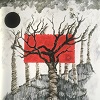A free space where one can speak. 'La fille qu’on appelle' by Tanguy Viel
DOI:
https://doi.org/10.51777/relief11446Keywords:
Tanguy Viel, narrator, imagination, ethics of response, sexual abuse, social vulnerabilityAbstract
In his eighth novel, La Fille qu’on appelle, Tanguy Viel breaks with the narrative dispositive he adopted in his earlier novels: the personal narrative. We study the form of this work from the angle of the new narrative freedom that it offers to the author and that he exploits in a paradoxical and original way: he invents an instance of narration that is not omniscient but omni-imagining, this which allows him to give his dispositive the ethical form of a response to a word that has not been heard and the thymic form of a lamentation of the tragic condition of the vulnerable to the grip of the powerful, such as the is Laura, the main character, sexually abused by the mayor of the city.
Downloads

Published
Issue
Section
License
Copyright (c) 2021 Sylvie Cadinot-Romerio

This work is licensed under a Creative Commons Attribution 4.0 International License.
All articles published in RELIEF appear in Open Access under the Creative Commons Attribution 4.0 International License (CC-BY 4.0). Under this licence, authors retain ownership of the copyright of their article, but they allow its unrestricted use, provided it is properly cited.






